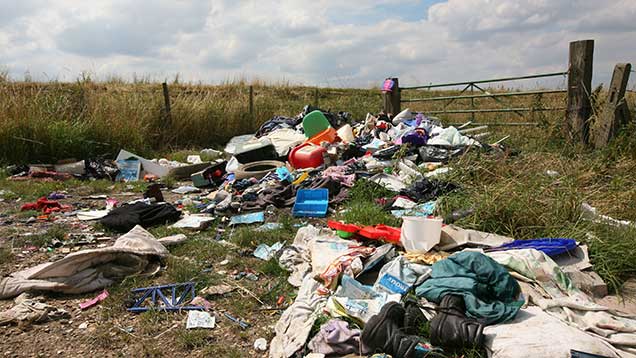New powers to combat illegal dumping of waste on farmland
 © Tim Scrivener
© Tim Scrivener Criminals who blight the countryside by dumping tonnes of waste on farmland will face tougher penalties in future, under new rules announced by government.
Fly-tipping and large-scale tipping of waste is a constant thorn in the side of farmers and landowners, who face footing the bill for the removal of unlawfully dumped waste.
According to the government, waste crime costs the UK economy about £568m each year – and diverts as much as £1bn each year away from legitimate business operations.
See also: Fly-tipping incidents cost councils and farmers £150m
Earlier this year, Defra figures suggested fly-tipped waste on private land costs the rural business sector between £50m to £150m in clean-up costs every year.
But new powers, which came into effect on 30 October, will enable authorities to suspend a waste operator’s permit if found to be in breach of laws and there is a risk of pollution.
Rogue waste site operators will also face swifter prosecutions and those found to flout waste laws continually will face legal action.
The legislative changes, announced by Defra and the Welsh government, come ahead of the introduction of fixed penalty notices for small scale fly-tipping next year, giving local authorities an alternative to costly prosecution.
According to the Welsh government, in Wales around 94% of waste management operators are “good, honest performers”. But a small fraction of poor performers were waste criminals that needed to be dealt with.
Wales’ Natural Resources minister Carl Sergeant said: “We have made it a priority to sort out these unscrupulous operators to ensure that waste crime doesn’t pay.
“The Welsh government, together with Natural Resources Wales (NRW), Defra and the Environment Agency has worked together to identify ways to strengthen our existing enforcement powers.”
The Country Land and Business Association (CLA), which represents about 33,000 landowners, farmers and rural businesses in England and Wales, welcomed the crackdown on waste crime.
CLA president Henry Robinson said: “Landowners and landlords have been left exposed to waste operators that have either gone bankrupt or disappeared leaving large amounts of waste on site.
“This abandoned waste then becomes the responsibility of the landowner. This can be extremely costly and can cause both environmental and safety problems.
“We welcome these legislative changes, which will allow the Environment Agency to take early action by revoking a permit.
“This can prevent continued stockpiling of waste, which means the landowner is less likely to be exposed to clear-up costs on the same scale as some have been faced with before now due to rogue waste operators.”
The CLA has called for culprits to be dealt with more robustly for years and it vowed to continue to press for greater powers for enforcement authorities.
